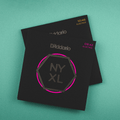KERRY KING
By Strings Direct – 29 August, 2023
PLAYER SPOTLIGHT
"The King 👑 Of Thrash 🤘 "I didn't want to play guitar"
The Breakdown (B.C. Rich)"

This instalment looks to shake the walls and is definitely not for the faint hearted ⚠️ ⚡️ This edition's featured character is larger than life and an absolute monster of rock! 👿
Arguably one of the key forefathers in the world of heavy metal's progression to thrash. 🤘 We open our ears, minds, and amplifier parking spaces to this landmark player who has dominated the hard-core metal scene for decades with his all-conquering band and live life to the full, take no prisoners persona.
A name so well respected within his field it's instantly recognisable along with his show-stopping iconic image. Ladies and gentlemen cue the synchronised head banging and articulated downstrokes it's Kerry King. 🎸

California Dreamin’
As we bring the magnifying glass over King for this week's Player Spotlight we discover that not everything is as it seems at first glance; we acclimatise ourselves to a strong, outgoing, and somewhat outrageous character... we generally imagine Kerry King to have always been a faithful in your face metal guitar giant but looking back we understand it could've gone either way.
Rewind to the golden years of California at the height of summer, Los Angeles 3rd of June 1964. Kerry Ray King entered the world and it shook just a little bit more than you would expect 😉
Interestingly he doesn't hail from a musical background or a particularly musical family, his father was an airline parts inspector and his mother worked for a telephone company.
When an upcoming player first encounters music or inquisitively gets drawn in by an instrument for the first time it's generally a life defining moment, but this wasn't quite the case here and by the sounds of things it could of never been:
Guitar.com:
What inspired you to pick up the guitar?
Kerry King: You know, that’s a stupid story because it wasn’t anything that was life-altering or mind-numbing where “I heard this guy and had to go play.” I attribute it to my dad, who was trying to give me a hobby to keep me off the streets. He gave me a couple of options and there was a guitar lying around my house, so I decided to take guitar lessons.

Kerry reflects that there were a few choices to keep him on the straight and narrow: along with music, karate appeared to be the other alternative, he quite openly displayed his feelings about this and he's pretty honest which is really cool to see.
“I didn't want to play guitar," King reveals in the interview. "My dad gave me a handful of things to keep me out of trouble when I was thirteen, the guitar was one of them and I think that karate was another. I didn't feel like getting my ass kicked every day, so this guitar thing sounds pretty awesome."
Kerry King - bravewords.com

Once Kerry had the desire for music and the need for guitar, influences soon became the dominant force. Kerry has openly stated that Eddie Van Halen was an initial standout influence along with Ted Nugent, Ronnie Montrose and Richie Blackmore.
As he developed his playing skills like many developing players the influences morphed together and varied along the journey, he has been quoted saying that Randy Rhodes was a real big influence along with David Murray & Andrian Smith.
Kerry always credits his fellow players as influences & inspirations such as Zakk Wylde and the late great `Dimebag Darrell.
Guitar.com:
Which players inspired you most in terms of style and tone
King: I think we’ve morphed into something completely different. But if you give credit to anybody, it would be the Judas Priest guitar style of two guitar players. We never went for the big time harmonies of the Iron Maiden dual guitar players. We went for more of the two-guitar rhythm attack.”
Kerry King for - guitar.com
King is heralded on the scene as a massively influential player to so many younger musicians in the generations coming through. The influence he has as a character and musician as well as the monolithic imprint his band has left on the metal world leads to an open-ended thoughtful reflection and review by the man himself.
Guitar.com:
In what ways has your approach to playing guitar evolved from the ’80s to now? What has specifically changed in your style and technique?
King: The only thing I could guess is that I pay more attention to leads. In the beginning, it was just full-blown make-something-up-I-don’t-care. We just had a real reckless approach to it. We still have that, but now I try to put some sense into it. Ten or twelve years ago, I noticed myself coming up in the guitar polls and I thought, “Man, I suck in the context of all these other guys!” So I took it upon myself to relearn what I was doing and still do the loose-cannon leads, but to play things that makes sense, as well.
Guitar.com:
You’ve been very influential to a lot of the younger bands that are coming up today. Do you hear yourself in any particular guitar player?
King: Oh yeah, a number of times, although I couldn’t even point one out in particular. You know, even for us, we make something up, but you can’t say we didn’t borrow from somebody down the line. It’s a lot harder to cover up who you got it from, although that’s something we’re really good at. If you listen to the new Chimaira record, you’ll hear a riff and say that sounds like Pantera. You’ll hear another riff and say that one’s like Killswitch. You’ll hear another riff and say that one’s kind of like us. But as far as I’m concerned, Chimaira is one of the few new bands that I really like. They’re like the second coming of all that is good in thrashland to me.
Kerry King for - guitar.com
Slayer 🤘

When overviewing this incredible band the first thing that comes to mind is a revolutionary, evolutionary, progression within the genre.
Heavy-metal at the start of the 1980s was already a progressive scene in many forms but with the arrival of the outrageous personality and musical aggression that is Kerry King combined with a like-minded and just as chaotic Jeff Hanneman something big was about to unfold.
The two met at an audition purely by chance got talking discussing influences and players - as you do - and decided to start their own band. In the earliest foundations this was the beginning of what would become the mighty Slayer.

Intensely aggressive, hard-hitting, and no holds barred playing made Slayer part of the “big four” in a new generation of heavy metal lending itself to the adaptive terminology “Thrash Metal”.
Standing as one of the titans of a newly carved evolution of a genre Slayer were sitting up there with Metallica, Megadeath, and Anthrax.
Slayer released twelve studio albums, two live albums, a box set, six music videos, two extended plays and a cover album. Four of the band's studio albums have received gold certification in the United States. Slayer sold 5 million copies in the United States from 1991 to 2013, according to Nielsen SoundScan, and over 20 million worldwide.
The band has received five Grammy Award nominations, winning one in 2007 for the song "Eyes of the Insane" and one in 2008 for the song "Final Six", both of which were from the album Christ Illusion (2006). After more than three decades of recording and performing, Slayer announced in January 2018 that it would embark on a farewell tour, which took place from May 2018 to November 2019, after which the band disbanded.
https://en.wikipedia.org/wiki/Slayer
Slayer are everything a hard-core metal band should be: pushing the boundaries an unsettling normality.
The band's lyrics and album art, which cover topics such as murder, serial killers, torture, genocide, politics, theories, human subject research, organised crime, secret societies, mythology, occultism, Satanism, hate crimes, terrorism, religion or anti-religion, Nazism, fascism, racism, xenophobia, misanthropy, war and prison, have generated album bans, delays, lawsuits and criticism from religious groups and factions of the general public. However, its music has been highly influential, often being cited by many bands as an influence musically, visually and lyrically; the band's third album, Reign in Blood (1986), has been described as one of the heaviest and most influential thrash metal albums.

Metal Monster = Mega Strings ?
As we come to the conclusion and an overview of this hard-hitting powerful player what can we expect in regards to strings? Strings that are going to withstand such force and highly fuelled adrenaline-based thrash riffing...
This type of aggressive player of course needs highly durable strings that can take excessive punishment for continued periods of time throughout an entire set or session.
We automatically tend to presume that guys playing heavy music are going to need extremely heavy beefy strings to get that punishing sound, as we discover here this isn't always true.
Kerry King has used various brands over the years including in the early days when he was quite set on D’Addario in the following specs.
Guitar.com:
What brand and gauge of strings are you using?
King: D’Addario. I use different gauges, depending on the tuning. For D#, I use .009-.042. For C#, I use .010-.046 and if we drop-D, I put a .056 on the bottom, instead of the .046.
https://guitar.com/features/kerry-king-interview-good-king/ - 2012

The current up-to-date setup Kerry has now moved onto the super high quality Jim Dunlop Strings and he has been using them for many years, initially in this specification:
For strings KFK relies on Jim Dunlop strings—.009–.042 for D#, .010–.046 for C#, and .010–.056 for B—and .88 Tortex Triangle picks with custom graphics.
(Premierguitar.com-Rig Rundown)
Now he has his own signature set thats adaptable for drop tunings which is such a cool idea!
THE LONG STORY
Jim Dunlop Lab Series
Kerry King worked with the Dunlop String Lab to create a set of strings that can withstand his full-throttle picking style, aggressive vibratos, and gnarly bends. Now armed with the Kerry King String Lab set, his sound stays crunchy, clear, and defined even at Slayer's high-speed tempos. Available in .010-.046, with an added .052 for drop tunings.
As we can see he is just using a standard 10 - 46 gauge with an adaptable .052 for alternative drop tunings so it's a relatively simple set up but what we do learn here is that Jim Dunlop Strings particularly can really take some considerable punishment because if you can hit harder than Kerry King and defeat these strings then that is some achievement. 🤘
* * * * *
REFERENCES
jimdunlop.com
https://www.premierguitar.com/gear/rig-rundown-slayer
https://www.latimes.com/entertainment-arts/music/story/2019-11-26/slayer-heavy-metal-farewell-last-shows-forum
https://www.rollingstone.com/music/music-news/heavy-metal-thunder-slayer-megadeth-and-anthrax-185010/
https://en.wikipedia.org/wiki/Slayer
https://www.zimbio.com/photos/Kerry+King/i8H43tHBIzE/Slayer+Megadeth+Play+Sydney
https://www.loudersound.com/features/slayer-s-kerry-king-my-life-story
https://en.wikipedia.org/wiki/Kerry_King
https://www.jimdunlop.com/string-lab-series-kerry-king-guitar-strings-10-52/
https://bravewords.com/news/slayer-guitarist-kerry-king-i-didnt-want-to-play-guitar-the-breakdown-long-form-video-interview-posted-contest-open-to-win-signature-guitar
https://bravewords.com/news/slayer-guitarist-kerry-king-i-didnt-want-to-play-guitar-the-breakdown-long-form-video-interview-posted-contest-open-to-win-signature-guitar






